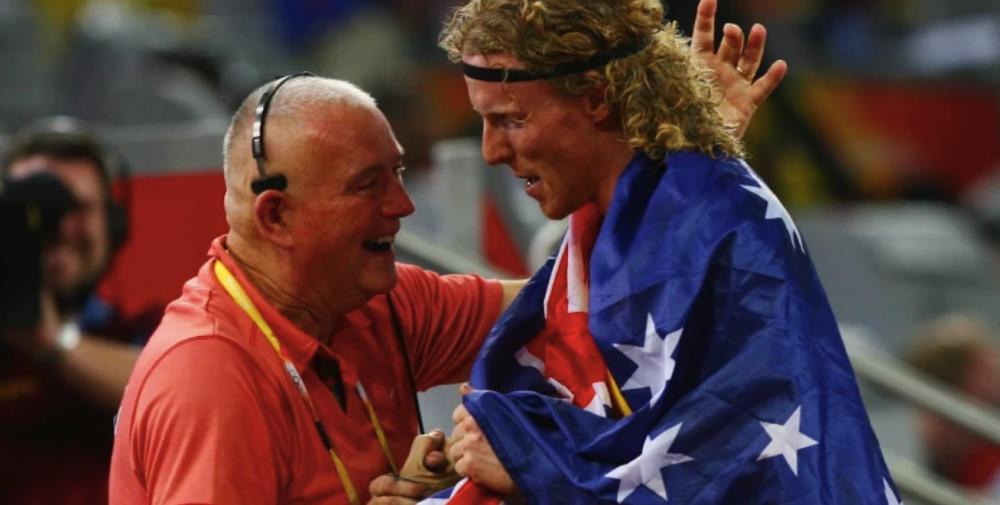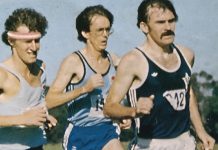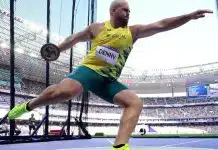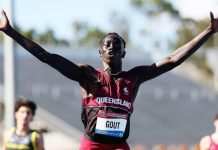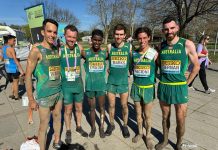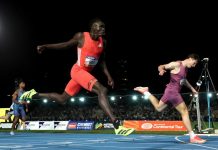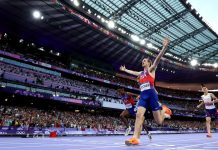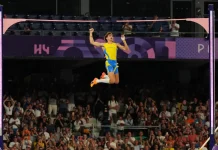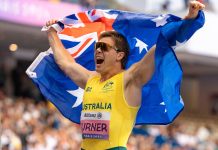The first time I encountered Maurie Plant was at the Montreal 1976 Olympic Games. I heard Maurie before I saw him (a not uncommon occurrence over the next 43 years).
I was on the concourse just inside the ticket entrance, Maurie was high above on the entry ramp to the upper levels bellowing out a ‘cooee!’ to any Australians in the vicinity and the world in general.
I should add, this is the first ‘meeting’ that I recall. Given that most encounters with Maurie tended to the memorable, I assume it was, therefore, the very first.
Two years later, when I competed in the Fukuoka marathon, I was the beneficiary of Maurie’s generosity. My recently-retired father was working part-time at a mate’s sporting goods warehouse. In Dad’s view, I was heading off to represent Australia with no official support.
Maurie had a connection with the same business. Dad must have mentioned it to him at some stage as he came home one day with an Australian tracksuit, courtesy of Maurie, for me to wear in Japan.
Both incidents speak to the man who was Maurie Plant. Always boisterous in his public support of Australian athletes, but always, too, happy to do something – anything – on the quiet to support them. The former quality was easy to notice, the latter too easily overlooked.
No-one, least of all Maurie, would pretend he was faultless. His passion for athletics was intense and at times boiled over. In this, he may have had something in common with legendary coach Percy Cerutty. Albie Thomas told me during an interview for The Landy Era that he treasured his relationship with Cerutty, who was his coach, but there were times when “Percy would say something (and) you’d wish you could crawl under the seat . . .”
Sometimes you might want to crawl under the seat when Maurie held forth, too, but the moment always passed. His over-riding love of the sport meant such things were soon forgotten.
One incident sticks in my mind. Carl Lewis came to Australia and New Zealand to compete in 1997. It was a closely-guarded secret but I got a tip from a source in America who had heard Lewis mention the trip. After we confirmed the story was genuine, it ran in The Age.
Around seven the next morning the phone rang in our hallway. On picking it up I stumbled into a tirade from Maurie about breaking the story he was at the very moment en route to Sydney to announce. In vain did I protest that the story had run on both the front and back pages – I couldn’t get a word in edgeways.
A day or so later, Maurie rang again. I expected another blast: instead, he suggested I talk the paper into sending me to New Zealand, where Lewis was to compete first, to interview him. Maurie didn’t hold grudges. These were two rare ‘scoops’ in my journalistic career.
A champion schoolboy athlete, some of whose records remained unbroken until recent times, Maurie Plant never went on to a significant senior career. Like many whose ambitions are unfulfilled, though, the contribution he made to athletics as a non-competitor far outweighs any he could have made on the track.
Defining that contribution precisely is another matter. As an erstwhile journalistic colleague, Scott Gullan, wrote in a tribute: “(Maurie) was an agent, promoter, commentator, liaison officer, confidante, fixer, problem solver, influencer, spruiker, father figure and always the life of the party.”
In short, he did almost everything. Such a man will be hard to replace. While this issue needs to be tackled, first we should remember, with fondness and gratitude, the things he did for the sport.
My intersection with the many roles of Maurie went to a higher level once I moved back to Melbourne from Canberra in 1986. Soon afterwards, I was offered a full-time job at The Age. Within a few more years Sydney had been awarded the 2000 Olympics and purse strings were drawn open in Australian media organisations. The freedom from budget restraints – something likely never to be repeated in the current media landscape – meant travel to overseas competition became a regular thing. At the same time, more overseas athletes wanted to travel to Australia to experience the place first-hand.
They were heady days for all of us. When top internationals came to Australia – Carl Lewis, Mike Powell, Marion Jones – Maurie would be on hand; when media travelled to world championships, Olympics or to follow the likes of Cathy Freeman in Europe, Maurie would be there, too. He had anecdotes, insights and entrée into all levels of the sport. No championship or one-day meeting would go by without his spending time sitting with the Australia media, sharing some of this information.
The lead-up to Sydney, the Games, and the post-Sydney period were the golden days. Freeman, Steve Hooker and Sally Pearson all won Olympic gold medals in this era. Maurie made a significant contribution to the success of all three, as each has attested on social media in the past few days.
The most enjoyable time, for me, at least, came after that. Having taken a redundancy package after the Beijing Olympics, I have worked variously for Runners Tribe, World Athletics (the IAAF) and local organising committees since. Free from the tyranny of newspaper deadlines, there has been much more time for combining work and chat. In 2010 and 2011, I worked on the Asian Games in Guangzhou and the World University Games in Shenzhen. Statistician Paul Jenes and Maurie were there, too. Sharing meals or a post-event drink, all the time “yacking” about athletics with these two experts, was a highlight of both trips.
Maurie’s health had not been great in recent times. He contracted septicaemia shortly after Christmas and had been in a coma from not long after being hospitalised. He never regained consciousness.
The Australian and international social media response to Maurie Plant’s passing confirms we have lost someone of great significance in our sport. Our condolences to his family and friends.


